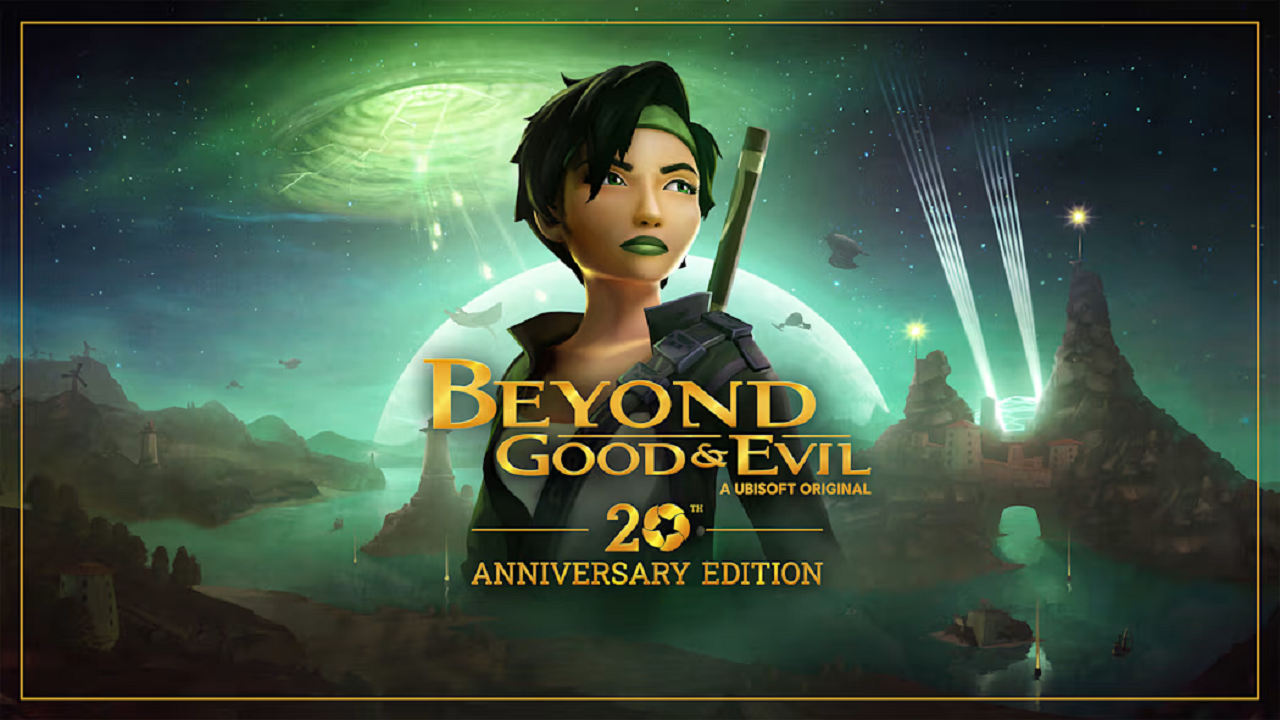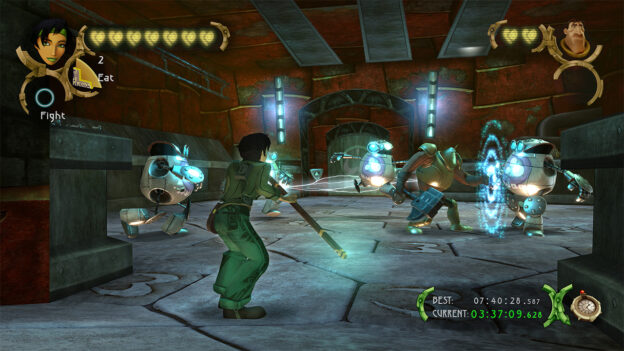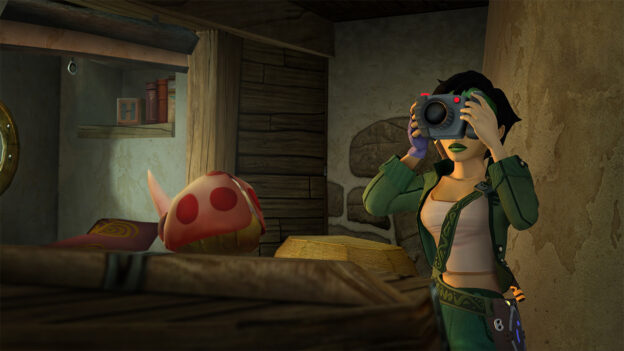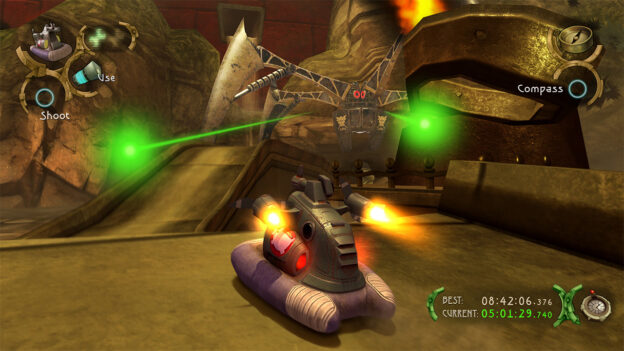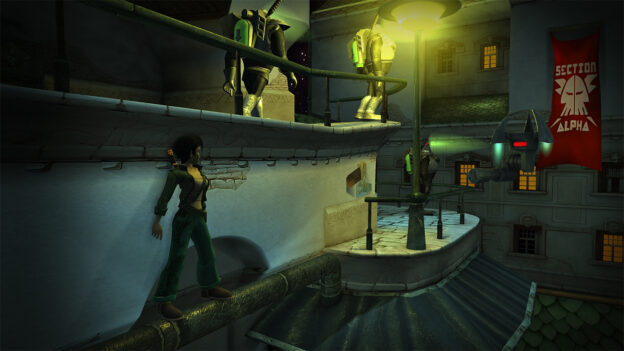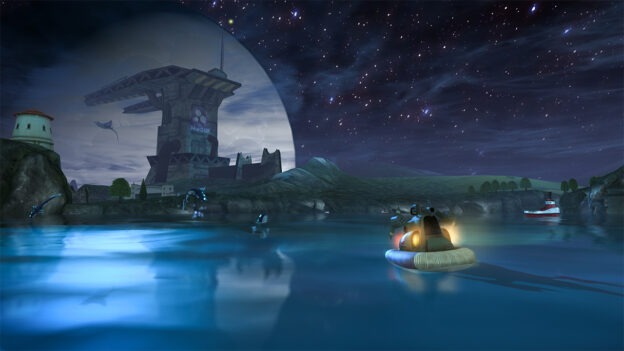It’s the rare video game that gets even better with age, but Beyond Good & Evil may be such an example. When I first played this Zelda-esque action-adventure in early 2004 on the Nintendo GameCube, it thrilled me to see a third-party effort hold its own against the greatness that was Wind Waker. Now, just over 20 years later, I’m delighted to have revisited Beyond Good & Evil on the Nintendo Switch in this 20th Anniversary Edition.
In some respects, my nostalgia makes for a less demanding review to pen. A great game from my youth is still great playing it in middle age. But what about gamers who dismiss any and all nostalgia outright? Or what about those (like my wife) who’ve never played Beyond Good & Evil? Allow me to remove any rose-colored glasses and critique this Switch port with a healthy measure of gaming acumen.
Said acumen lets me call out Ubisoft for pushing an account creation for internet play. While I already have a Ubisoft Connect account, what about players who prefer not to? When I tried Beyond Good & Evil on a second profile, I had to put my Switch in airplane mode as it was the only way to progress past the title screen to play! This embarrassing force attempt on Ubisoft’s part leaves an awful first impression. Thank goodness you can bypass it, but let’s hope this gets patched out entirely so the criticism it’s attracting stops distracting from an otherwise great game.
The plot has you play as Jade, watchful protector of fellow orphans, and soon the whole planet of Hillys from the alien DomZ armada threat. She’s a capable martial artist in the mold of earlier 3D Zelda games (my last Zelda comparison, I promise). She’s arguably an even more capable photographic reporter, something you’ll quickly discover. At first, Jade’s shutterbug tendencies are used simply for necessary profit. She’ll get paid to snap pictures of various creatures and send them to the science center, which allows for purchasing health, upgrades, and more. Much joy (and challenge) can be had seeking out and capturing the most elusive of critters.
Before long, Jade and her camera are needed to unravel far-reaching mysteries. As threats start hitting closer to her home planet, she’ll take the lead on exposing a conspiracy, infiltrating hidden areas (usually alongside companion sidekicks Peyj and/or Double H) to capture the truth on film. In many ways, it’s the classic, time-tested science fiction tale mixed with political undertones—think the Rebel Alliance vs the Empire. Emotional theatrics get seen and heard as you roam the city, coming from those on opposite ends of the spectrum or even the seemingly neutral. Some is peripheral background chatter (news broadcast with a spin or protestors chanting), while more is only revealed to curious players (newspapers delivered to your inbox or conversations with security on the streets). The plot and characters add plenty of color to the proceedings, and the city genuinely feels abuzz with liveliness.
That feeling extends to pretty much every area. From dark caves to a seedy factory, from spirited race tracks to the smallest nook, life extends well beyond the city walls. Even if you’re quietly bobbing on the water, you’ll see other boats proceeding with their business. Look up in the sky, and you’ll see ships flying about. Now and again, the sky will turn dark, and you’ll see the DomZ invaders attack, too! But careful hovercraft upgrades at Mammagos Garage should ensure you can battle them effectively.
The on-foot combat as Jade is straightforward enough, with her wielding her stick ala Darth Maul (my last Star Wars comparison, I swear). From simple rats to the most problematic alien bosses, she controls well, especially considering this game first launched in late 2003. But I realized something while replaying this game for the first time in many years, and it’s that combat never feels like it comes to the fore. That’s not a bad thing. Jade’s preeminent weapon is her camera, with stealth frequently preferable to fighting. Heck, some of the best standout sections have you fleeing as fast as you can, with cinematic flair. Perhaps this is why a formerly T-rated game is now E10+.
I’ve noticed many critics hover around the 10-hour mark to beat this one, give or take an hour. I think 15 is far more accurate, over even 20-plus if you have completionist leanings. Some “dungeon” layouts and puzzles are tricky, especially on the first play. The end boss has a jarring learning curve, even on replay! Even exploring off the beaten path, though not always strictly necessary, is quite enjoyable. Plus, Beyond Good & Evil is a game you’ll want to replay as you try to theorize on the cryptic ending. In the mildest of spoilers, it teases a sequel (announced in 2008) that’s unlikely to be released. And based on 2017’s non-gameplay trailer laden with f-bombs, that’s probably best.
Some extras and QoL updates (achievements if connected online and autosaving) are here. Most compelling are the various storyboards, art pieces, E3 press kits, videos, and more that chronicle the game’s development process. Most curious is a speed run mode; does this style of game benefit from such an inclusion? I don’t see myself sacrificing exploration, but it’s a harmless option for those interested.
I’d be remiss if I didn’t briefly mention this game’s audio/visual package on Switch. The “updated audio and remastered soundtrack” proves tricky. I wish I had a better ear, but I found the differences altogether subtle. I also wish there was a music player in-game to compare these tracks on the fly. Even still (save for Slaughterhouse Scramble making me lunge for the mute button), this is a high-quality soundtrack, by and large. The tunes are fitting, mood-evoking, and (at least in my case, as I hummed along) memorable. It’s an eclectic mix, but for a game already dripping with atmosphere, it only adds to it.
The “improved graphics” seem chiefly like a resolution bump at first glance, with generally more distinct imagery and improved character models standing out. Better detail and lighting enhancements also become more noticeable over time. But you’ll still see a few muddy textures or witness the odd trace of jittery stutter when wrestling with the camera in tight quarters. And that’s okay. This game already looked great 20 years ago, so even minor improvements are appreciated.
Beyond Good & Evil is proving a timeless game, and $19.99 for this 20th Anniversry edition with extras and updates is “beyond” fair. In truth, the original was already great back in the day, though being beloved by critics didn’t translate into high sales. So, I’m happy that this action-adventure is getting progressively more popular with the advancement of time, as it’s an outstanding game not to be missed!
Review: Beyond Good & Evil 20th Anniversary Edition (Nintendo Switch)
Great
Beyond Good & Evil is proving a timeless game, and $19.99 for this 20th Anniversry edition with extras and updates is “beyond” fair. In truth, the original was already great back in the day, though being beloved by critics didn’t translate into high sales. So, I’m happy that this action-adventure is getting progressively more popular with the advancement of time, as it’s an outstanding game not to be missed!

